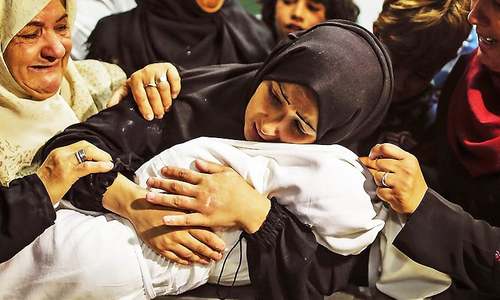JERUSALEM: Israeli jets on Tuesday bombed targets in the Gaza Strip hours after militants from the territory fired more than 25 mortar shells toward communities in southern Israel in what appeared to be the largest single barrage since the 2014 war.
The Israeli military said no one was hurt and that most of the shells were intercepted by the Iron Dome defence system, though one landed near a kindergarten shortly before it opened.
The high volume of projectiles came as tensions have been running high in recent weeks following the deaths of over 100 Palestinians from Israeli fire during mass protests along the border. Israel says it holds Gaza’s Hamas rulers responsible for the bloodshed.
“Israel will exact a heavy price from those who seek to harm it, and we see Hamas as responsible for preventing such attacks,” Prime Minister Benjamin Netanyahu said following the barrage.
Shortly after that warning, Israeli jets began dropping bombs on what security officials in Gaza said was an Islamic Jihad militant training site.
Smoke was seen rising near the town of Deir al-Balah in the coastal strip, and the Israeli military said the explosions there were related to its activity. No injuries were reported.
The Israeli military said it carried out over 35 air strikes on seven sites across Gaza, including an unfinished tunnel near the city of Rafah that crossed under the border into Egypt.
The sudden surge in violence brought back memories of the devastating 2014 war between Israel and Hamas. That round of fighting began with tit-for-tat attacks on both sides and escalated into a full-blown war that inflicted heavy damage on Gaza.
“We are prepared for a great variety of scenarios,” said the army’s chief spokesman, Brig. Gen. Ronen Manelis. “The way the coming days look will depend on the choices of the Hamas terrorist organisation.” Islamic Jihad was believed to be behind the mortar fire, which appeared to be retaliation for the deaths of three of its fighters in an Israeli air strike earlier this week.
“We are sticking to the right of return as well as responding to the Zionist crimes,” said Khaled al-Batsh, an Islamic Jihad leader in Gaza who also has helped coordinate the past two months of border protests.
Ismail Radwan, a Hamas official, said the “resistance is capable of hurting the occupation and it proved this today by responding to its crimes.” Elsewhere in Gaza, two fishing boats carrying students and medical patients set sail out of Gaza City’s port, aiming to reach Cyprus and break an 11-year naval blockade that Egypt and Israel imposed after Hamas seized power in Gaza. Hamas acknowledged it was mostly a symbolic act.
The expedition would be a new way of challenging the blockade but also raises the possibility of more confrontation and violence. Israel bars Gaza boats from going more than six miles into the Mediterranean Sea. Organisers said they lost contact with the ships when they were 12 nautical miles from shore, but it wasn’t clear whether it was due to a technical issue or seizure by the Israeli navy.
It also marks eight years since Israeli commandos raided a Gaza-bound aid flotilla, killing nine pro-Palestinian Turks and sparking an international outcry against the blockade.
Published in Dawn, May 30th, 2018















































